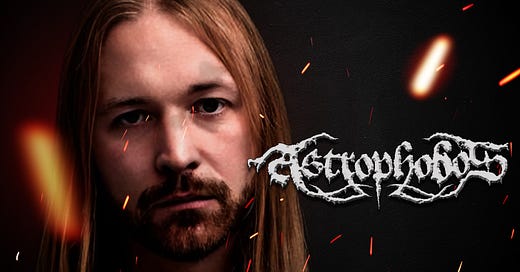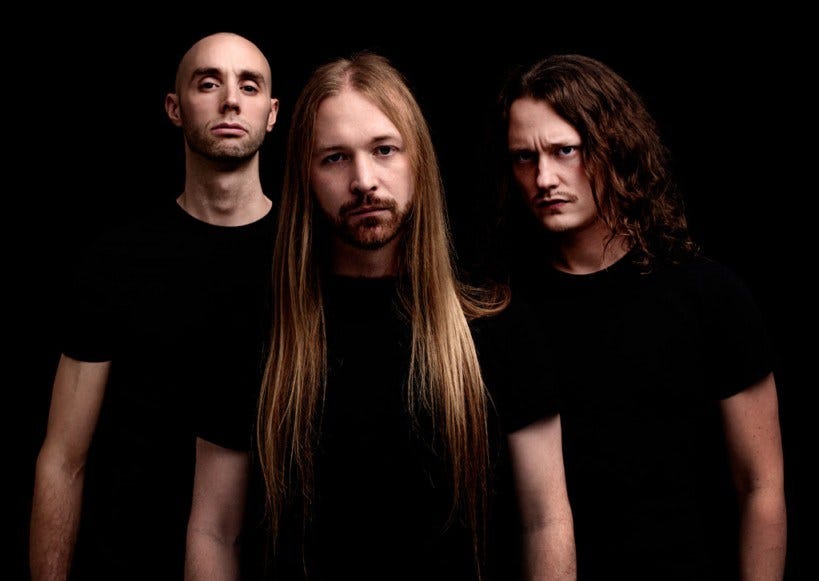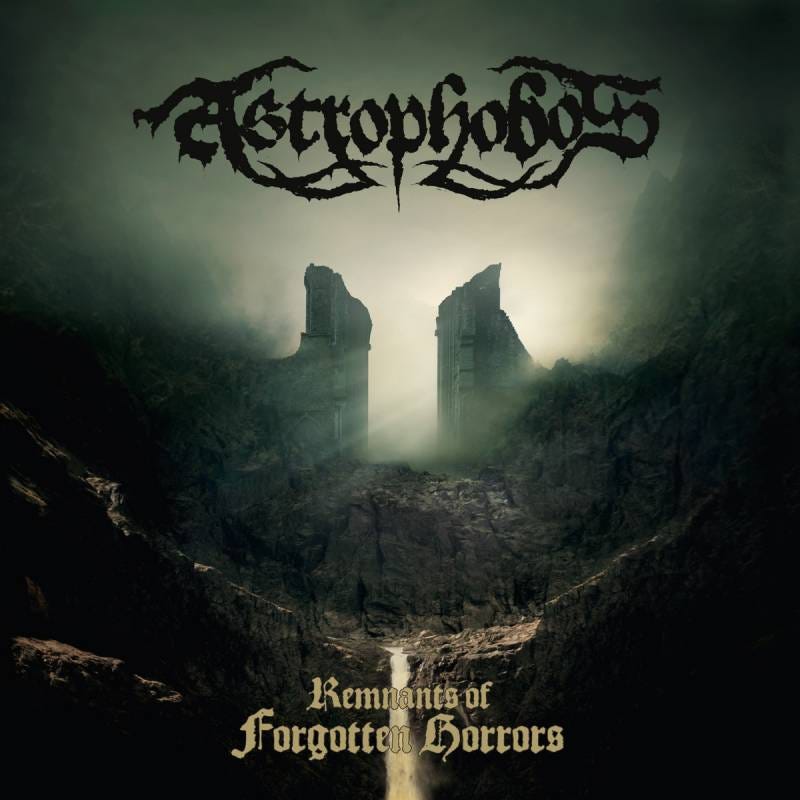Lovecraft Mythos with Astrophobos' Micke and Martin
"t’s still a suitable basis for setting the mood in black metal if you don’t really feel like having Satanist lyrics"
Astrophobos are relative newcomers to the Swedish black metal, but with the release of their debut full-length Remnants Of Forgotten Horrors they’re certainly poised to make a real name for themselves by having both killer musicianship and a different angle on the standard lyricism in the scene. We recently had the chance to talk to Micke (lead vocalist and bass player) and Martin (lead guitarist) about their take on black metal, as well as discuss the release of their new album.
MB: It’s been about a month or so since Remnants Of Forgotten Horrors has been released, how has it been received by the critics?
Micke: Pretty good in general, most reviews are 7 or 8 out of 10, so that’s encouraging.
MB: The name, Astrophobos, I assume is an H.P. Lovecraft reference?
Martin: Yes!
MB: So how much influence is Lovecraft to your lyrics and overall vibe?
Micke: Quite a lot, I’d say about half the lyrics are inspired by Lovecraft, more or less. I try to avoid specific references, just so it doesn’t seem like too much fan-fiction. That being said, it’s still a suitable basis for setting the mood in black metal if you don’t really feel like having Satanist lyrics, which we don’t.
MB: Absolutely, Lovecraft’s writings definitely lend themselves to extreme metal, Bal-Sagoth is one band that comes to mind with Lovecraftian lyrics.
Micke: Yeah, I think some early Rotting Christ as well.
Martin: Deicide too. Morbid Angel, we’re in good company.
MB: You say you don’t really get into the Satanic lyrics, why is that? Is it just not interesting to you, or do you feel that it’s been done to death?
Martin: Well, the four of us were raised in a secular part of Sweden. Religion has never really been an issue for us, so adapting the satanic approach wouldn’t really feel honest because religion doesn’t play a big part in our life in any shape or form.
Micke: Yeah, and also, just to spell it out, we are not Satanists in anyway, or religious in any way, so it would very much feel like a gimmick for us. It wouldn’t really suit us personally to go that route.
MB: I do find it a bit interesting that you don’t lean towards that type of lyrics. It seems that the Swedish black metal scene has many, many bands that go for the misanthropic/satanic stance, such as Dissection, and Naglfar.
Micke: Yeah, if you back up about 20 years or so, it almost seemed kind of mandatory to have those kind of lyrics, but it still never really appealed to us. It just wouldn’t be honest for us, it would feel like theater. We don’t really want there to be too much of a difference between our personal lives and the black metal that we play.
Martin: And I think for bands like Watain it’s an ideology and a lifestyle, so for us to claim the same thing wouldn’t be honest.
MB: We had an interview with Morgan from Marduk recently, where he essentially said it’s not black metal unless there’s Satanism in the mix.
Martin: (laughs) Well that’s one definition, and I totally accept that to be his definition, or anybody else’s. I mean black metal is just one way to describe what we do, and disregarding the lyrics, it would seem to be the most fitting label for the type of music we play. If he or anybody else prefers to call it death metal or whatever, it doesn’t really mean anything to us.
Micke: And going back to how it was in the 90’s, when we started listening to black metal, it seemed that the music and Satanism were kind of inseparable. We don’t really see it that way, and whatever anybody else’s definition of what black metal is or isn’t is up to them, I think we see that you can black metal without Satanist lyrics. That being said, Watain and Marduk are both bands that we really like and listen to.
MB: You also don’t seem to be the corpse paint, pentagrams, and armor type either.
Martin: We really have nothing against it, but we’re also kind of…comfortable. Makeup seems like a bit of a chore. I have nothing against bands that use that, I can certainly see that it adds to the atmosphere of the show.
MB: Something I noticed with your sound, and in fact many extreme metal bands from Sweden for that matter, is a more melodic approach. Each regional scene in metal has it’s own approach, and at least from what I’ve seen, Sweden’s is a more melodic sound. Do you know why that is?
Martin: Yeah, I actually don’t know why that is. I guess a lot of people have speculated that it’s rooted in folk music or whatever. From our point of view, it’s kind of based on the bands we grew up listening to, whom did great stuff with melodies but still had a really hard edge.
Micke: For us, we aren’t really pioneers or anything, so we’ve just kept going in that vein.
MB: I’ve also noticed in the Swedish black metal scene, your band included, that the sound hasn’t really delved into the experimental side of things. You see bands in the U.S. that have incorporated shoegaze and other non-metal genres into the sound. Why do you think that is the case?
Martin: Well, I kind of like the new USBM style. The bands don’t seem to care too much about the roots, and take the sound to new places, with extremely varying results, of course. Some of the bands certainly stumble on new and interesting things, but for us it’s more about doing what comes naturally. It’s not that complex, or taking the sound to completely new places.
Micke: I think we also decided early on to keep our music in the standard instrumentation set-up: two guitars, drums, bass, and vocals. We didn’t really want to do too much in the studio that wouldn’t be possible to do live. It limits it a bit from being the “symphonic” or “classical” style: no violins, or choirs, pre-recorded drum bits or whatever, so we don’t really do much experimentation with the instrumentation.
MB: Right, just back to basics, no frills black metal.
Martin: I don’t see us doing backtracks or anything like that live just to make a song work. If you can’t play it live like you do in the rehearsal room, it’s not going to hold up.
MB: You mentioned earlier having 4 members, but the drummer is a very recent addition. How did that come about?
Martin: We’d been looking for a permanent drummer for some time, (laughs) which is kind of an understatement. We had Fredrik Widigs, who is now playing live with Marduk, play as a session member on our album, which turned out really good. However, he obviously has a lot of engagements, so we got the impression that he was never really on the table. I think we were actually at a Lord Belial show in Stockholm last autumn, when we kind of stumbled upon Jocke, who we recognized from playing in Valkyrja, and with whom we probably had a couple of beers before that. We chatted with him a bit, pitched our band, and I think we gave him a Spotify link or something, and he liked the stuff.
Micke: He agreed to be a live drummer with us, so we started rehearsing for our album release gig. It turned out that we all got along well, and it was agreed that he would be a permanent member.
Martin: We’re really thrilled about that, he’s an excellent drummer and a really cool guy.
Micke: And a very reliable drummer.
MB: Do you all have any musical influences that metal fans might find surprising, like maybe any non-metal influences?
Martin: Well, I think we like all kinds of music, really. Micke, do you have anything in particular you want to mention?
Micke: Bah, no, I don’t know (laughs). Sorry to be so vague, heh. It’s not like when you’re a teenager and part of the sub-culture, where it kind of felt sacrilegious to listen to anything except metal, but we don’t really restrict ourselves with what we listen to.
Martin: I agree. Good music is good music, and I don’t really care if it’s black metal or singer-songwriter, or even Die Antwoord, anything good is good. I think you can pretty much be inspired by any style of music in unexpected ways.
Micke: Absolutely. This album ended up kind of being kind of a typical black metal sound, but if you don’t want to sound like you’ve stolen riffs and just repeated old material, I think you kind of have to take inspiration from other styles as well.
MB: Have you gotten to share the stage with any of the bands you’re influenced by yet?
Martin: No, we’ve actually just got started playing. We released the ep (Arcane Secrets) back in 2010, and then for various reasons it took us a long while to get the full length out, so we didn’t really feel comfortable getting started with live shows until we had an album to back it up. That’s why we decided to wait.
MB: Tell me about Triumvirate Records.
Martin: A little bit of history on that; we were signed to a label a couple of years back, we started wheeling and dealing with them after the release of the ep, and we were under contract with them to release our debut album. The recordings were done in September 2012, and obviously with the album getting released in January 2014 there was a bit of a delay. In the end, it didn’t work out, because the label was struggling with financial and other issues, so we managed to get out of the contract we’d signed.
Micke: They never really got around to releasing the album, and when we asked about it they just kind of said “Yeah, well...soon, maybe” and then soon never came.
Martin: In order to not repeat the same process all over again, we started Triumivirate ourselves and released the album just to get it out there as soon as possible.
MB: You also just released a music video very recently. How did the filming of that go?
Micke: Yes, that was fun! It was a friend of Martin’s.
Martin: Yeah, his name is Jakob Berglund, and plays in a band called A Swarm Of The Sun with Erik Nilsson who produced our ep and full length. So we got to know Jakob through Erik.
Micke: I think he was the one that approached us, and asked if we were interested in doing a video. We discussed it for a while and talked about what other bands have done in the metal genre, and wound up compiling a list of things we didn’t want to do. The problem was also that we pretty much had no budget, but we talked about it with Jakob and found some inspirations we could pretty much agree on. It ended up being a video by an artist called Soap&Skin, where there was mostly filth, close-ups, smudged lenses and out-of focus shots, things crawling. We agreed that something like that wouldn’t be too cliché, and wouldn’t be too cheesy either. It was done right, and I think he (Jakob) really succeeded. I was originally a bit reluctant to do a video, but after the discussions, we got along with the ideas Jakob had.
MB: It’s a great video, really trippy. I think I saw some tentacles in there, another nod to Lovecraft I assume.
Micke: Haha, yep, there’s an octopus somewhere in there.
Martin: Our squid co-star. I think Jakob succeeded in making it a little bit disturbing, and a little bit uncomfortable. There were quick cuts, a stroboscope, and weird squid parts. We’re really happy with the results, and happy that it didn’t end up being “Call Of The Winter Moon.”
Micke: Hahaha!! Yes, that was on the list of don’ts, exactly.
MB: So what’s next for the band? Are you going to be trying to play any festivals or do any touring?
Micke: We talked about that, but decided it’s a bit late in the year to try to get on any festivals. If we’d had the album out a few months ago, we probably could have sent it out to a few festival organizers, but if we don’t get a lot of gigs soon, we’ll probably just get started writing new material and then recording it.
MB: Well, you have a great record, something to certainly be proud of, thank you for your time!
Micke & Martin: Thank you!




